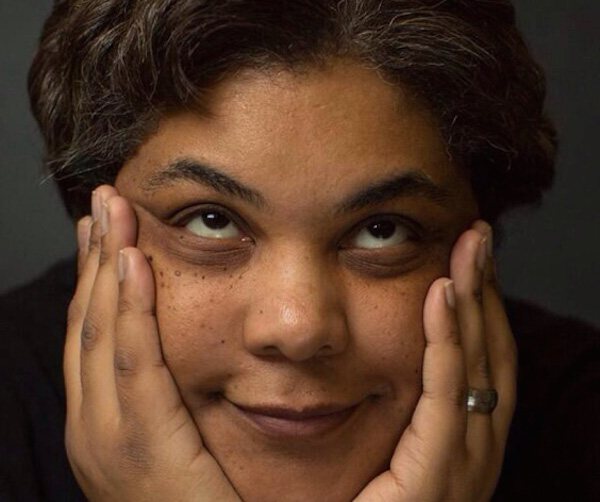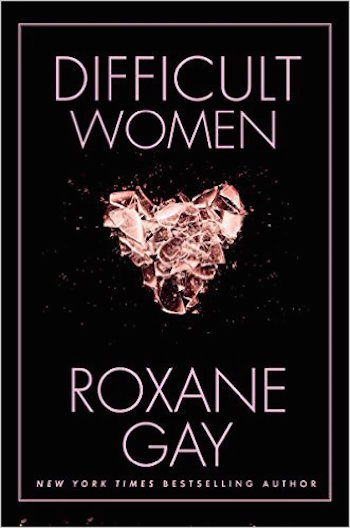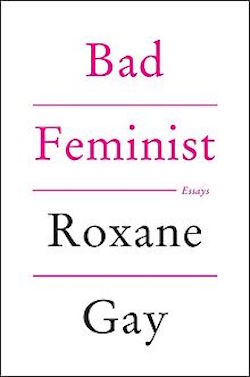Book Review: Roxane Gay — A Writer of Unusual Sensibility
Roxane Gay is a bold writer of impressive range who experiments with magic realism, dystopia, and fantasy.
Difficult Women by Roxane Gay. Grove Atlantic, 272 pages, $25.

Roxane Gay. Photo: Roxane Gay.com
By Helen Epstein
Roxane Gay, the 42-year-old author, cultural critic, university professor, prolific tweeter and blogger, seemed to have burst onto the literary scene out of nowhere in 2014 with two well-received books: the novel An Untamed State and a collection of essays titled Bad Feminist. In fact, Gay had been steadily garnering a readership of her fiction and non-fiction in small literary magazines and on websites such as The Rumpus, Jezebel, and Salon for 20 years.
Difficult Women brings together 21 of these stories. It’s a collection that is both spectacular and uneven, best read in small doses. Gay is a bold writer of impressive range who experiments with magic realism, dystopia, and fantasy in addition to writing in a straightforward realistic style. Her best stories are stunningly powerful. They portray varieties of unconventional love and violence between men and women, women and women, parents and children, friends and siblings, and make us look at the interconnections between race, gender, class and levels of education. They are largely set in run-of-the-mill American locales that have not received much literary attention. What’s not run-of-the-mill is Gay’s voice. Even the most distressing of these stories are narrated in a deceptively casual voice that blends piercing observation, judicious reflection, recurrent accounts of graphic sex, and sly humor.
“I have moved to the edge of the world for two years,” Gay begins the love story “North Country.” She is on a cruise of Lake Superior. “If I am not careful, I will fall….I arm myself with a flask, a warm coat, and a book. At the dock, there’s a long line of ruddy Michiganders chatting amiably about when they expect the first snow to fall. It is August. I have just moved to the Upper Peninsula to assume a post-doc at the Michigan Institute of Technology. My colleagues, all civil engineers, wave to me. ‘You came!’ they shout. They’ve already started drinking. I take a nip from my flask. I need to catch up. ‘You’re going to love this cruise,’ they say. ‘Are you single?’ they ask….I am the only woman in the department and, as such, I am a double novelty.”
The narrator hasn’t yet divulged that she is brown-skinned and the reader is, at first, puzzled by the recurrent assumption that the “double novelty” can only have come from Detroit. “I have been asked this question twenty-three times since moving to the area. In a month, I will stop counting, having reached a four-digit number. Shortly after that, I will begin telling people I have recently arrived from Africa. They will nod and exhale excitedly and ask about my tribe.”
The next person who asks if she’s from Detroit – an Upper Peninsula (white) logger who lives in a trailer in his sister’s back yard – pursues the narrator and, in this — the most romantic and lest violent of her stories — becomes her faithful, if unlikely, friend and lover.
Even if the reader knows nothing about Roxane Gay’s rape by a group of boys at age 12, which she writes about in Bad Feminist, her recurrent, insistent theme of sexual self-punishment signals to the reader the after-effects of trauma. Gay’s women characters often ask men to brutalize them; in one story about a women’s fight club they beat up each other. These stories are often shocking and uncomfortable to read, but Gay’s generous sensibility draws the reader in.

“La Negra Blanca” features Sarah, a blonde, bi-racial student who works as a pole dancer in a Maryland strip club. “She tans three days a week, naked, so there are no lines. She sees an aesthetician for a full body waxing once or twice a month, enhances her hairstyle with blond extensions replaced every two months. She works out for two hours a day, seven days a week, eats fourteen hundred calories a day. It is an exhausting regimen but an occupational hazard. She attends Johns Hopkins University during the week, where tuition costs almost forty thousand dollars, and financial aid covers only two-thirds of that cost. Sarah pays for the rest out of her own pocket. She has one year remaining before she graduates with degrees in international studies and Romance languages, plus coursework in Arabic. It is 2004. She plans on working for the CIA because she has becomes quite efficient at passing.”
In this contemporary spin on an old theme, Sierra, as she is called in the club, accommodates the demands of repeat clients such as William Livingston III, who “visits her at the club three times a week, Wednesdays, Fridays, and Saturdays” and tips as much as five hundred dollars. Sierra “straddles his lap and sexily removes her bra, wrapping it around his balding head and then looping it around his neck like a leash. She squeezes her beasts together, flicks her tongue across her nipples…The more money he slides beneath the narrow waistband of her G-string, the lower and harder she grinds her hips. If Sierra looks down and sees a crown of bills wrapping her waist, she’ll let William hold her ass even though he always leaves little bruises.” When, ultimately, he follows her home and rapes her, Sierra doesn’t call the police. Rape is an “occupational hazard,” she tells her kind friend Alvarez, a waiter sin papeles who cares for her.
If you are averse to reading about rough sex, Difficult Women is not for you. Several times, I put the book down, wondering how prevalent the sadism and masochism that pervade the lives of Gay’s characters is today. Her stories make visible what’s invisible in our daily lives, the private battles of women around us at the theater, the supermarket, or in the waiting rooms of our dentists and doctors. In Gay’s view, they are enterprising, practical women who live with haunting memories that reverberate in their lives and exacerbate daily predations, but these females make do. They are not “difficult” as the title of this collection suggests, but deeply injured.
Gay does not idealize them, nor does she demonize the men, who are largely supporting characters. Some, like William, are brutes, but others, such as Alvarez, are gentle, nurturing, and more reliable than the women. Many are unemployed or underemployed: a logger who lives in a trailer, a window dresser, the manager of a small airfield.
Despite the very American locales – one story takes place in a gated community of Naples, Florida; another, near Las Vegas – the characters in Difficult Women remind me of the characters in Elena Ferrante’s Neapolitan Quartet. The two writers share an unsentimental view of friendship between women, an extraordinary candor, keen observational skill, an interest in the sociological backdrop, and a willingness to skate the thin line between realism and pornography. Sometimes, like Ferrante, Gay slips into purple prose. But, for the most part, these hard-hitting stories pack such a punch and reflect such a range of experience that I was as curious to know more about the woman who wrote them.

Unlike Ferrante, Roxane Gay makes no secret of her identity. Her essays are enlivened by frequent autobiographical references and her unusual bio is available online. She was born to Haitian immigrants who came to Omaha to study and stayed on to raise their family (her father is a civil engineer). She was the only black child in her elementary school until her younger brother joined her. She led a mostly unremarkable Midwestern life in a religiously observant Catholic family. Then, at the age of 12, she was gang-raped at the instigation of a classmate, a boy she considered to be her friend. In “Strange Gods,” the ultimate story in Difficult Women and one of the fictionalized iterations of this traumatic event, the narrator’s mother says. “’You don’t ever have to talk about this. We can pretend this never happened.’ I didn’t and we did.”
In her real life, Gay put on so much weight that her parents sent her to weight-loss camps (her forthcoming memoir, due out in June of this year, is titled Hunger: A Memoir of (My) Body). They also sent her away to boarding school at Phillips-Exeter, where an English teacher who paid close attention to what she was writing in class recommended that she seek counseling. After graduating in 1992, Gay went on to Yale University and completed two years. Then, at age 19, she met a man on the internet and disappeared for a year without a trace.
After her parents tracked her down, Roxane Gay finished college, then earned a doctoral degree in technical writing in the Midwest, where she now is an associate professor of creative writing.
Her bio helps explain the range of Gay’s locales, her highly sexualized subject matter, and her comfort with intersectional feminism, a term that refers to applying overlapping lenses of race, class, and gender to the issue of point of view. But no bio can account for her many gifts as a story-teller and her unusual sensibility as a writer.
Helen Epstein is the author, co-author, editor or translator of ten books of non-fiction. She e-publishes classics of non-fiction with Patrick Mehr here.
Tagged: Bad Feminist, Culture Vulture, Difficult Women, Grove Atlantic

Thank’s for a sensitive, informative introduction to this writer who I might have passed by as a media phenomenon, and whose books I’ll now seek out.